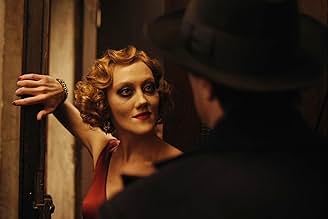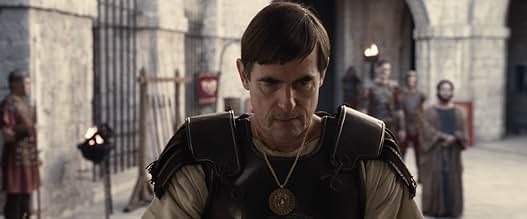NOTE IMDb
7,2/10
3,8 k
MA NOTE
D'après le roman "Maître et Marguerite" de Mikhaïl Boulgakov. Un écrivain célèbre est censuré par l'État soviétique : son roman est interdit et la première théâtrale de sa nouvelle pièce sur... Tout lireD'après le roman "Maître et Marguerite" de Mikhaïl Boulgakov. Un écrivain célèbre est censuré par l'État soviétique : son roman est interdit et la première théâtrale de sa nouvelle pièce sur Ponce Pilate est annulée.D'après le roman "Maître et Marguerite" de Mikhaïl Boulgakov. Un écrivain célèbre est censuré par l'État soviétique : son roman est interdit et la première théâtrale de sa nouvelle pièce sur Ponce Pilate est annulée.
- Récompenses
- 1 nomination au total
Histoire
Le saviez-vous
- ConnexionsReferenced in Close-Up: Which is Better - Movies or Series? (2024)
Commentaire à la une
The book. The film. The book. The film. A continuous confrontation with no winners. In my book (pun intended), with The Master and Margarita by Bulgakov you can't do the film without the book. And this is my major premise in this review. Had I not reacquainted myself with the book prior to the film, I wouldn't have gained either the gist of the latter or the dark satirical wisdom of the novel yet again. Instead, I had done my homework: immersed myself in the book, watched professors of literature on Bulgakov's hidden motives, vicariously walked along Moscow streets with the help of a youtube tour.
One of the crucial things I quarried on this expedition is that Bulgakov spent 12 years writing the masterpiece (between 1928 and 1940). No wonder, this resulted in incredible density of the text: 2-dimension narrative, vividly drawn characters, spellbinding dialogues and descriptions. Every plotline comes packed with loads of profound subtexts. And again, I could only appreciate all this only after my versatile reasearch. Let's take Frida's appearance for example. Seemingly passing, this character alludes to the idea of MERCY and the way Margarita gracefully personifies MERCY. She raises to the challenge of freeing Frida from eternal punishment. This clemency is mirrored by Pilat's reluctance from eternal punishment to extend MERCY to Yeshua (Jesus of Nazareth) in Jerusalem setting of the novel.
Methinks, MERCY is the crux of the novel. Methinks, it never shone through in the film though. Having embraced all the landmark events, the director chose to rearrange them in another order under the over-arching story of Master and Margarita's romance. I have to say it for the director, the reshuffled episodes are given in a surprisingly cohesive order. And yet, you can't have it all. If you focus on the love line, you cannot thoroughly cover Professor Woland (the devil) and his retinue's visit to Moscow. The way they challenge moscovites' religious convictions and condemn the behaviour of Massolit's corrupt social climbers and profiteers, Behemoth's whims and Koroviev's vagaries also have to go. Interestingly though, the creators took the risk of adding one more dimension - the author's life, which allegedly parallels Michhail Bulgakov's misfortunes and hardships against the backdrop of heavy criticism for his works and plays.
So, in the production the main character Master is somewhat expanded: not only does he personify the book character, but he also sheds some light on Bulgakov's love-hate relationship with the Soviet authorities. Both personalities were successfully performed by Eugeny Tsyganov. He was really convincing in his role of a distressed and desperate genius. His devoted lover Margarita by Julia Snigir left me cold. Guilty as charged, I couldn't help comparing this cinematic milk-and-water Margarita to that I envisaged when reading. My Margarita came across as a volatile and vibrant woman, let alone her witch's acquired personality. Having turned into a witch, Bulgakov's Margarita completely transformed, became restless, reckless even. Passion unleashed. None of this was played out by Julia. Unluckily, she could not hold her own with August Diehl - Woland (Devil in disguise). The latter, though, is a vital example of how successful directors' decisions can be cast wise. Orchestrating his character, August Diehl demonstrated an ample scope: from playful remarks to devilishly frightening preaches. Hats off!
Another movie character which made an indelible impression on me is Moscow. The city enveils each and every scene. The 3-dimension plot is set in utopian Moscow. Moscow which was in actual fact designed by Stalin's people. Moscow which never happened. These oppressive behemoth buildings hover over the humdrum of Moscow daily life, keep an eye on the citizens, remind them of the ruler. This formidable city could've been drawn with better graphics, but even so the mystique of the narrative rubbed off on me.
Needless to say, this multifarious creation has been getting a relentless onslaught of criticism. The critics' major contention is that this production is nothing more than just another slick "Hollywood-esque" knock off: the romance, the city, the blasts. Without wishing to encroach on culture-vultures' territory, I agree to disagree with this degrading look. Nor do I buy this "the film is based very loosely on the book" stance. Why should it be? We are looking at two different art forms here. Whereas literature is about setting off a reader's reflective judgments and imagining through language, cinematic art abounds in all sorts of technical and creative components: lighting, camera angles, sound design, editing, and acting. All these make a film a coherent and powerful visual tale. And from where I am standing, The Master and Margarita's cinematic adaptation panned out as powerful.
It's been two weeks since I finished reading and went to the cinema. The fact that I keep thinking about both the film and the book is quite telling. Seldom do I indulge in that profound research on cinematic forms. Apparently, both worked for me and triggered the whole gamut of emotions. In my mind palace these two are merging into each other, accomplishing each other. And this is a very complex and ingenious picture. I wouldn't have fathomed the film without a prior reading. Nor would my emotions would be that strong without the rendition. The manifold idea behind both of them makes plain "I liked", "I didn't like" review nigh on impossible. My recommendation is to do both and to make the cogs in your brain turn. Buckle down and enjoy the trip.
One of the crucial things I quarried on this expedition is that Bulgakov spent 12 years writing the masterpiece (between 1928 and 1940). No wonder, this resulted in incredible density of the text: 2-dimension narrative, vividly drawn characters, spellbinding dialogues and descriptions. Every plotline comes packed with loads of profound subtexts. And again, I could only appreciate all this only after my versatile reasearch. Let's take Frida's appearance for example. Seemingly passing, this character alludes to the idea of MERCY and the way Margarita gracefully personifies MERCY. She raises to the challenge of freeing Frida from eternal punishment. This clemency is mirrored by Pilat's reluctance from eternal punishment to extend MERCY to Yeshua (Jesus of Nazareth) in Jerusalem setting of the novel.
Methinks, MERCY is the crux of the novel. Methinks, it never shone through in the film though. Having embraced all the landmark events, the director chose to rearrange them in another order under the over-arching story of Master and Margarita's romance. I have to say it for the director, the reshuffled episodes are given in a surprisingly cohesive order. And yet, you can't have it all. If you focus on the love line, you cannot thoroughly cover Professor Woland (the devil) and his retinue's visit to Moscow. The way they challenge moscovites' religious convictions and condemn the behaviour of Massolit's corrupt social climbers and profiteers, Behemoth's whims and Koroviev's vagaries also have to go. Interestingly though, the creators took the risk of adding one more dimension - the author's life, which allegedly parallels Michhail Bulgakov's misfortunes and hardships against the backdrop of heavy criticism for his works and plays.
So, in the production the main character Master is somewhat expanded: not only does he personify the book character, but he also sheds some light on Bulgakov's love-hate relationship with the Soviet authorities. Both personalities were successfully performed by Eugeny Tsyganov. He was really convincing in his role of a distressed and desperate genius. His devoted lover Margarita by Julia Snigir left me cold. Guilty as charged, I couldn't help comparing this cinematic milk-and-water Margarita to that I envisaged when reading. My Margarita came across as a volatile and vibrant woman, let alone her witch's acquired personality. Having turned into a witch, Bulgakov's Margarita completely transformed, became restless, reckless even. Passion unleashed. None of this was played out by Julia. Unluckily, she could not hold her own with August Diehl - Woland (Devil in disguise). The latter, though, is a vital example of how successful directors' decisions can be cast wise. Orchestrating his character, August Diehl demonstrated an ample scope: from playful remarks to devilishly frightening preaches. Hats off!
Another movie character which made an indelible impression on me is Moscow. The city enveils each and every scene. The 3-dimension plot is set in utopian Moscow. Moscow which was in actual fact designed by Stalin's people. Moscow which never happened. These oppressive behemoth buildings hover over the humdrum of Moscow daily life, keep an eye on the citizens, remind them of the ruler. This formidable city could've been drawn with better graphics, but even so the mystique of the narrative rubbed off on me.
Needless to say, this multifarious creation has been getting a relentless onslaught of criticism. The critics' major contention is that this production is nothing more than just another slick "Hollywood-esque" knock off: the romance, the city, the blasts. Without wishing to encroach on culture-vultures' territory, I agree to disagree with this degrading look. Nor do I buy this "the film is based very loosely on the book" stance. Why should it be? We are looking at two different art forms here. Whereas literature is about setting off a reader's reflective judgments and imagining through language, cinematic art abounds in all sorts of technical and creative components: lighting, camera angles, sound design, editing, and acting. All these make a film a coherent and powerful visual tale. And from where I am standing, The Master and Margarita's cinematic adaptation panned out as powerful.
It's been two weeks since I finished reading and went to the cinema. The fact that I keep thinking about both the film and the book is quite telling. Seldom do I indulge in that profound research on cinematic forms. Apparently, both worked for me and triggered the whole gamut of emotions. In my mind palace these two are merging into each other, accomplishing each other. And this is a very complex and ingenious picture. I wouldn't have fathomed the film without a prior reading. Nor would my emotions would be that strong without the rendition. The manifold idea behind both of them makes plain "I liked", "I didn't like" review nigh on impossible. My recommendation is to do both and to make the cogs in your brain turn. Buckle down and enjoy the trip.
- sashafaershtein
- 13 févr. 2024
- Permalien
Meilleurs choix
Connectez-vous pour évaluer et suivre la liste de favoris afin de recevoir des recommandations personnalisées
- How long is The Master and Margarita?Alimenté par Alexa
Détails
Box-office
- Budget
- 1 200 000 000 RUR (estimé)
- Montant brut mondial
- 28 001 163 $US
- Durée2 heures 37 minutes
- Couleur
- Rapport de forme
- 2.39:1
Contribuer à cette page
Suggérer une modification ou ajouter du contenu manquant

Lacune principale
What is the Canadian French language plot outline for Le maître et Marguerite (2023)?
Répondre
![Regarder Trailer [OV]](https://m.media-amazon.com/images/M/MV5BZTk1ODEzN2MtYzRiZS00NTBlLWIxYmMtM2E4MzYxYTU4YWU0XkEyXkFqcGdeQXRyYW5zY29kZS13b3JrZmxvdw@@._V1_QL75_UX500_CR0)































